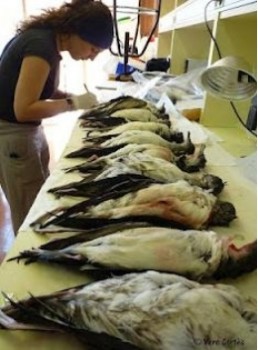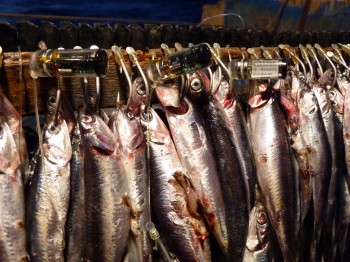Vero Cortés, a PhD student in the Biodiversity Research Institute (IRBio) and the Departament Biologia Animal (Vertebrats) at the Universitat de Barcelona, under the direction of Jacob González-Solís, late last month commenced at-sea trials off Spain’s Mediterranean coast to test the effectiveness of mitigation measures to reduce incidental catch of seabirds in demersal longline fisheries (click here).
A seabird species of special concern is the Critically Endangered (and ACAP-listed) Balearic Shearwater Puffinus mauretanicus, which breeds only on Spain’s Balearic Islands. Another species at risk is the closely-related (and an ACAP candidate for listing) Yelkouan Shearwater P. yelkouan – which is also a Mediterranean breeding endemic.

A student examines Balearic and Yelkouan Shearwaters drowned on a longline
“To work together with fishers is essential to solve this problem. Consequently, some longline fishers who work on Catalan seaboard participate in this project in order to find a common solution”, explains Vero, the project coordinator.
Trials will include looking at night setting and bird-scaring (streamer) lines as mitigation methods and the use of Time-Depth Recorders to assess the sink rates of baited hooks.

Longline hooks baited with European Anchovy Engraulis encrasicolus and carrying TDRs wait to go over the side
Photographs by Vero Cortés
In addition to the sea trials, lectures and workshops will be held for fishers who work out of Catalan fishing ports. “The aim is to inform them about the advantages and disadvantages of the relation between fishing and seabirds, emphasizing incidental catch and the measure[s] to reduce it. These actions want to achieve longline fishers’ involvement to get a more sustainable and environmentally friendly fishing activity.”
You can follow the field work on the project’s Blog (in Spanish).
With thanks to Vero Cortés and Jacob González-Solís for information
John Cooper, ACAP Information Officer, 3 June 2013

 English
English  Français
Français  Español
Español